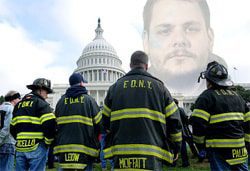
Ground Zero first responders who have been stricken with cancer in the years since the 9/11 terrorist attacks could soon receive the assistance so many of them desperately need. On Friday, the National Institute of Safety and Health (NIOSH) proposed that 50 different cancers be added to the list of illnesses eligible for free healthcare […]
 Ground Zero first responders who have been stricken with cancer in the years since the 9/11 terrorist attacks could soon receive the assistance so many of them desperately need. On Friday, the National Institute of Safety and Health (NIOSH) proposed that 50 different cancers be added to the list of illnesses eligible for free healthcare and compensation under the James Zadroga 9/11 Health and Compensation Act’s 9/11 Victim Compensation Fund.
Ground Zero first responders who have been stricken with cancer in the years since the 9/11 terrorist attacks could soon receive the assistance so many of them desperately need. On Friday, the National Institute of Safety and Health (NIOSH) proposed that 50 different cancers be added to the list of illnesses eligible for free healthcare and compensation under the James Zadroga 9/11 Health and Compensation Act’s 9/11 Victim Compensation Fund.
It was only last July that Dr. John Howard, director of NIOSH, had declined to list any form of cancer as a Zadroga Act covered illness, citing a lack of hard scientific evidence linking toxic dust at Ground Zero to development of the disease. But since then, a study published in the Lancet showed that firefighters exposed to ground zero toxic substances had about 20 percent higher rate of cancer than firefighters who were not exposed. A yet-to-be-published study conducted by the Mount Sinai School of Medicine also found a 14 percent increase in cancer rates among rescue workers, including significant increases in prostate, thyroid and certain blood cancers. The study was the largest of its kind, involving 20,000 Ground Zero responders.
In March the World Trade Center Health Program Scientific/Technical Advisory Committee recommended that cancers of the respiratory and digestive system, along with thyroid cancer, breast cancer, ovarian cancer, eye cancer, oral cavity cancer, urinary tract cancer, mesothelioma, melanoma, leukemia, lymphoma, soft tissue sarcomas and all childhood and rare cancers, be deemed covered illnesses. On Friday, Howard announced that NIOSH had decided to abide by all of the Committee’s recommendations.
“We recognize how personal the issue of cancer and all of the health conditions related to the World Trade Center tragedy are to 9/11 responders, survivors and their loved ones,” Howard said in a NIOSH statement.
Advocates for sickened Ground Zero workers were obviously cheered by the announcement.
“We were always optimistic that NIOSH would do the ‘right thing,’ by our 9/11 heroes. I will enjoy calling our clients to tell them their cancer has been added to the list of covered illnesses under the Zadroga Act,” said Matthew McCauley, lead attorney in the WTC/Zadroga group at Parker Waichman LLP, a national law firm that represents sickened responders. Parker Waichman had lobbied hard, first for passage of the Zadroga Act, and then for the inclusion of cancer as a covered illness.
“I think it’s an important statement that the country’s going to take care of the workers and people who are there to save the lives of the people of the city,” New York Representative Caroline Mahoney, a Democrat, said in a statement.
Once the cancer rule is finalized, Ground Zero first responders with covered forms of the disease will be able to apply for health coverage and compensation if they make a plausible case that their illness could be linked to exposure to toxic dust at the World Trade Center site.


